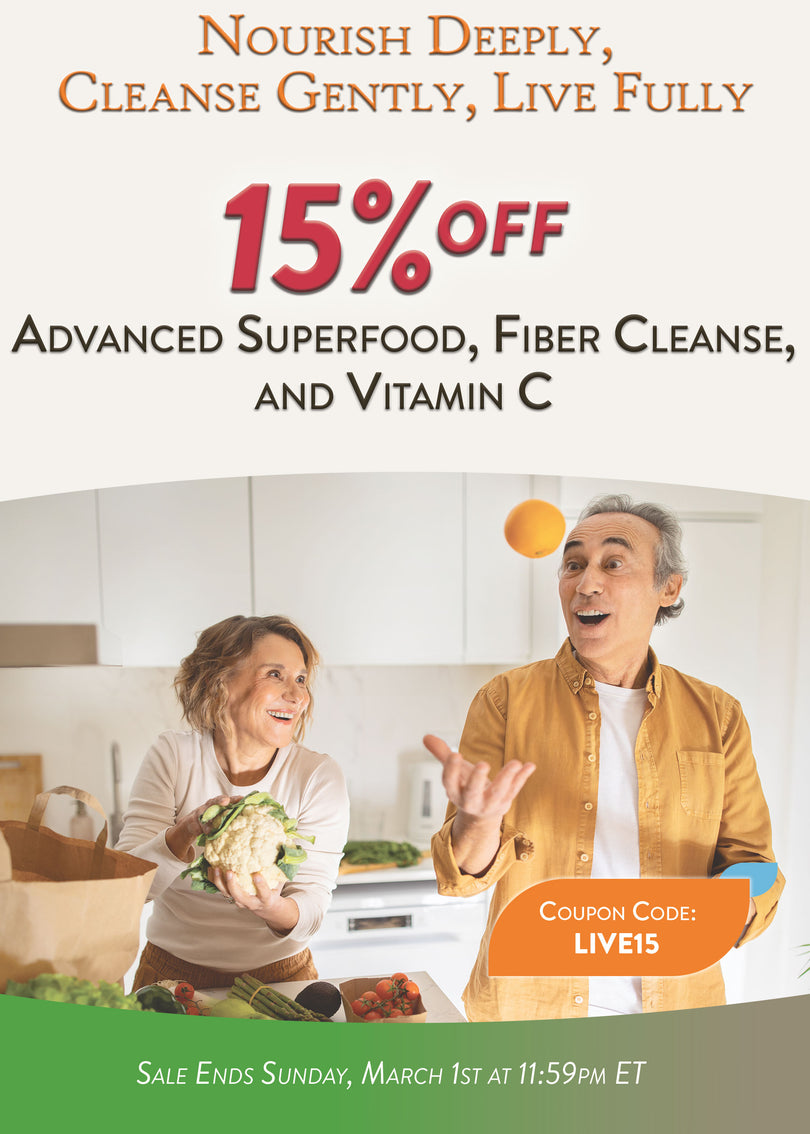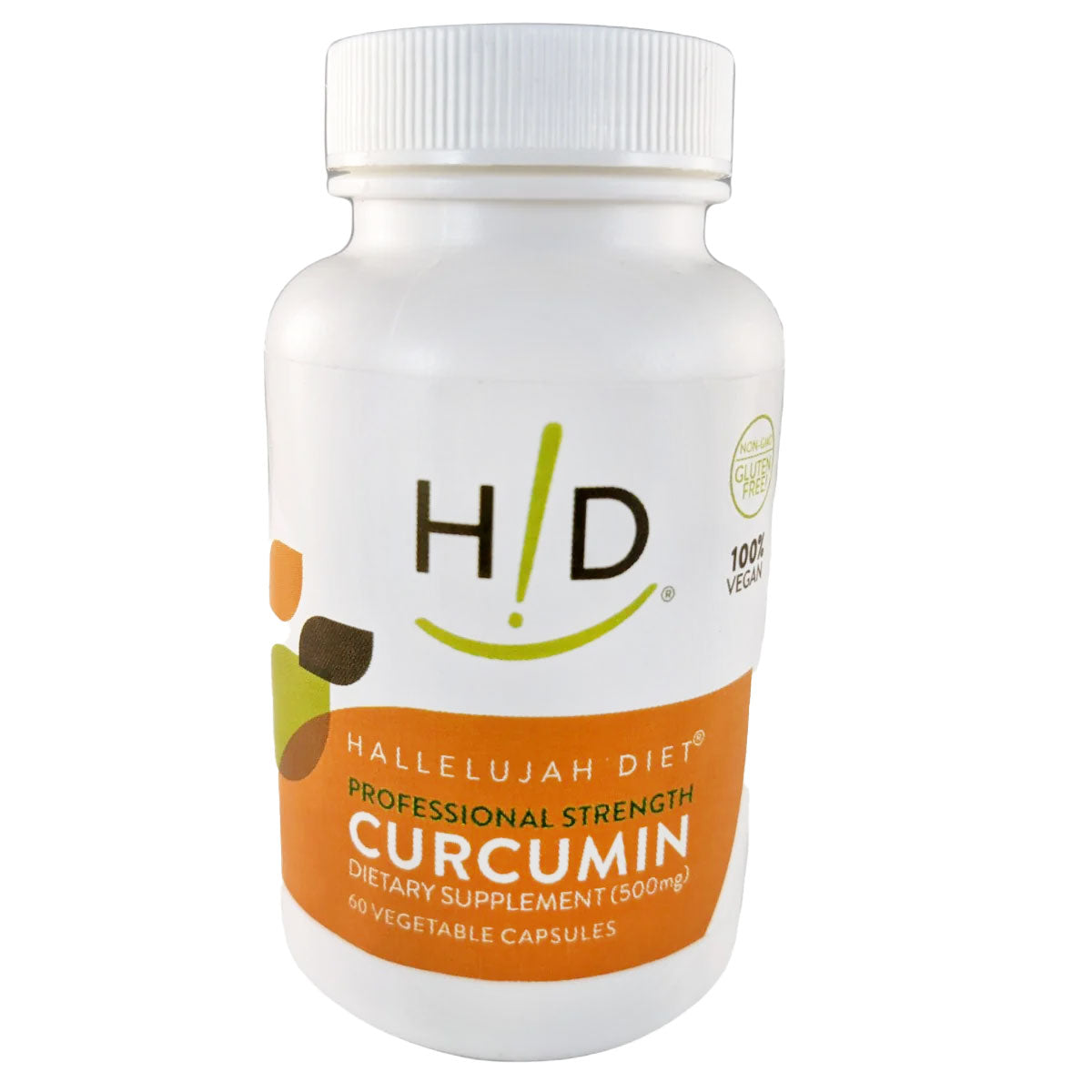
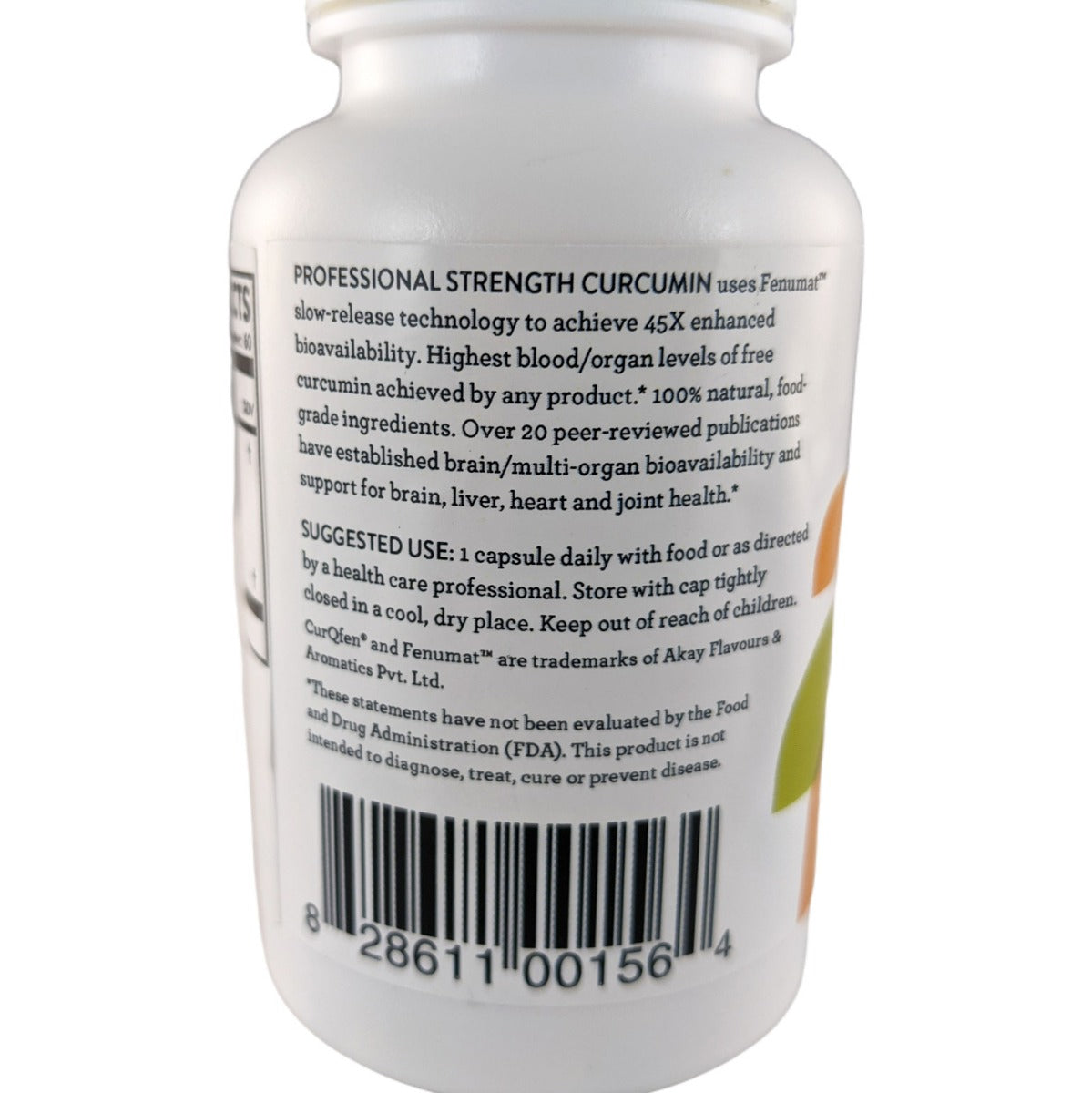
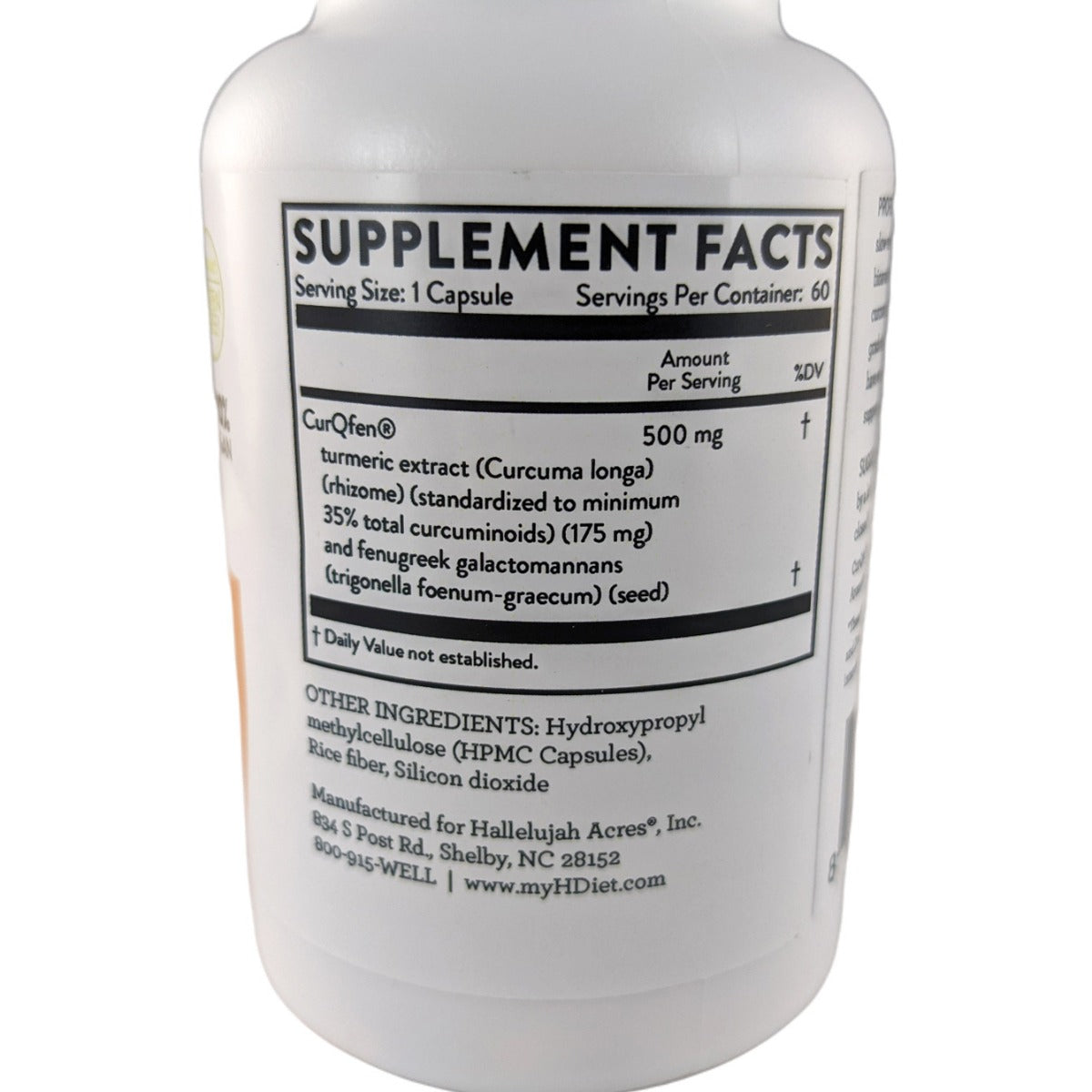
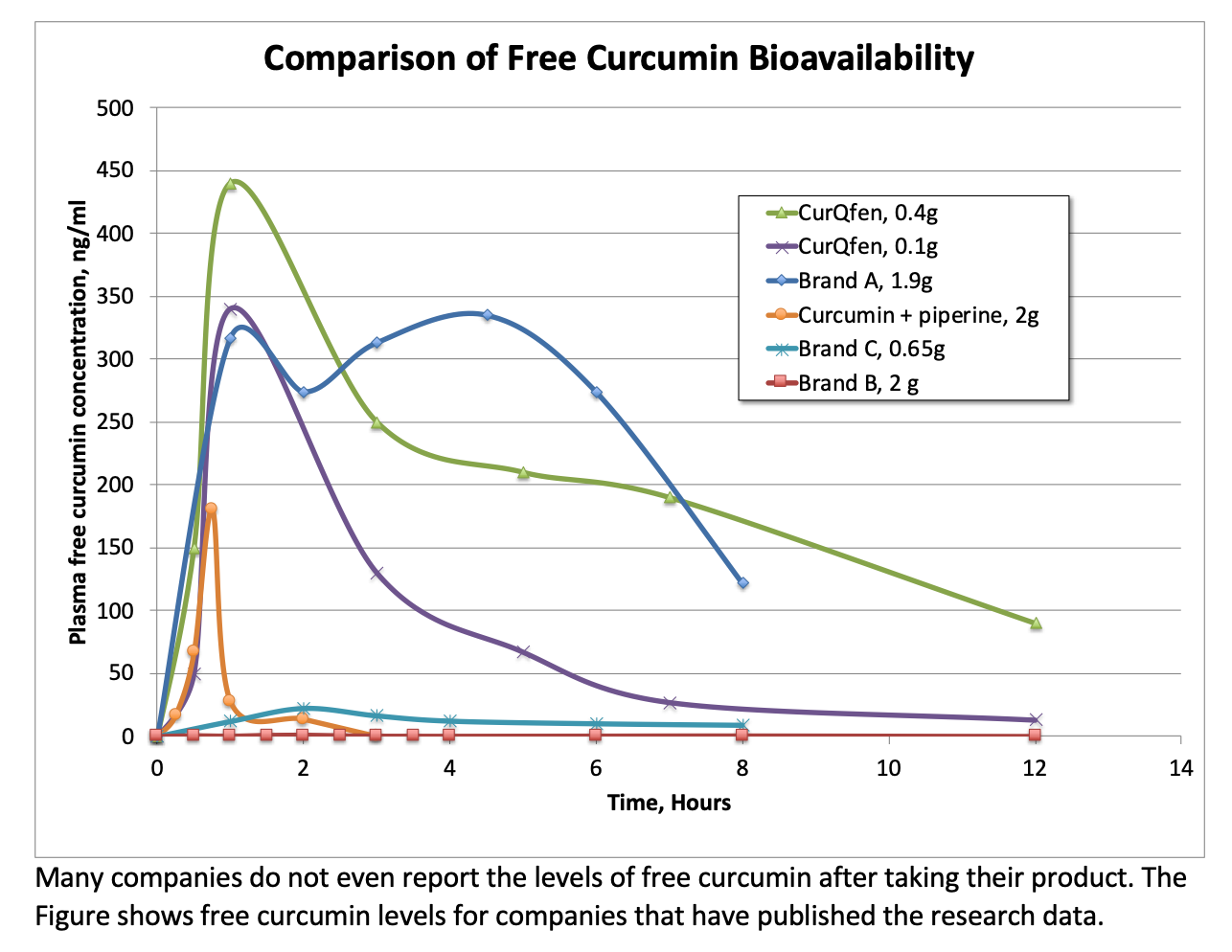
Professional Strength Curcumin
Professional Strength Curcumin with CurQfen™
Inflammation Doesn't Stand a Chance—Support Your Body Where It Matters Most
When your body is inflamed, everything suffers—your joints ache, your digestion falters, your brain slows, and your energy plummets. Chronic inflammation is the hidden culprit behind countless health struggles, and ignoring it only allows it to spread silently, stealing your vitality day by day.
But what if you could fight it at the source—powerfully, naturally, and effectively?
Meet your new daily must-have: Hallelujah Diet’s Professional Strength Curcumin with CurQfen®—a breakthrough anti-inflammatory formula designed to do what ordinary turmeric supplements can’t.
Why This Curcumin Supplement Stands Above the Rest
Not all curcumin is created equal. In fact, most supplements pass through your body with little to no absorption. Our formula uses CurQfen®—a patented blend of 95% pure curcuminoids and fenugreek fiber—to ensure your body actually absorbs and uses this powerful anti-inflammatory compound.
🟡 Superior Bioavailability: CurQfen® is clinically shown to provide up to 45.5x greater bioavailability than standard curcumin, meaning you get maximum benefits, fast.
🟡 Whole-Body Inflammation Support: Whether you’re dealing with stiff joints, brain fog, gut irritation, or post-exercise soreness, curcumin helps calm inflammation throughout your entire body.
🟡 Natural Pain Relief: Want a plant-based way to support joint comfort and mobility without harsh chemicals or side effects? This supplement is a safe, effective alternative to over-the-counter pain relievers.
🟡 Brain & Mood Booster: Curcumin doesn’t just help the body—it helps the mind. Research suggests it can enhance cognitive clarity, memory, and even support a balanced mood by reducing neuroinflammation.
🟡 Cellular Protection & Antioxidant Power: Fight back against oxidative stress and free radical damage—two major drivers of aging and disease.
🟡 Clean, Professional Grade Formula: 100% plant-based, non-GMO, free from synthetic fillers, and made with your health in mind.
Who Needs Professional Strength Curcumin?
- Struggling with stiff or swollen joints
- Recovering from intense workouts or chronic soreness
- Managing autoimmune conditions or chronic inflammation
- Experiencing brain fog, fatigue, or mood swings
- Wanting daily protection against the aging effects of oxidative stress
This isn’t just a supplement—it’s your body’s daily defense system in a capsule.
Don’t Just Mask the Symptoms. Fight the Root Cause.
Pain. Inflammation. Fatigue. They don’t just happen overnight—and they won’t go away with a quick fix. Curcumin is one of nature’s most powerful tools for long-term, whole-body healing.
If you're serious about your health, this is the supplement you can't afford to skip.
Support your joints. Protect your brain. Reduce inflammation. Feel alive again.
👉 Add Hallelujah Diet’s Professional Strength Curcumin with CurQfen® to your wellness routine today—and discover what life feels like when your body isn't fighting against itself.
How is CurQfen™ made?
Professional Strength Curcumin with CurQfen™ is a combination of purified curcuminoids and fenugreek fiber, referred to technically as curcumin-galactomannan (CGM). These are not simply thrown together into the capsule. In the processing of Professional Strength Curcumin with CurQfen™ purified fenugreek fiber is hydrated to form a gel. Then the curcumin is impregnated into the gel using sonication methods which micronizes the curcumin particles and imbeds them deeply into the gel. The gel is then dehydrated and powdered for stabilization. When you consume the capsule the gel is rehydrated and curcumin is slowly released into the GI tract. This slow release from the gel appears to allow most of the curcumin to bypass conjugation (metabolism into less active forms of curcumin which are quickly cleared from the liver) and get into the bloodstream in the free curcumin form.
Why is CurQfen™ better than other formulations?
There are 2 problems with getting good effects from curcumin:
- Absorption from the GI tract is low
- Metabolism of curcumin in body very quick—very low levels of “free” (unmetabolized, unconjugated) curcumin in body
CurQfen™ answers both of these questions. Not only is absorption high, but it is in the free form that is more biologically beneficial. Blood levels of free curcumin after taking even low doses of 100 or 400 mg are higher than seen by much higher doses of other products on the market, as shown in the Figure.
Curcumin is sometimes sold with piperine added to improve absorption. This result is shown in the Figure. The peak for this product is 180 ng/ml, which is far below the 440 ng/ml seen with CurQfen™. Other products may be advertised as being much more bioavailable than standard curcumin, but when you look at the blood levels in volunteers who have taken curcumin, the levels are very, very low, as seen with Brand B and Brand C in the Figure below. But 12 hours after taking CurQfen™ there is still about 100 ng/ml, which is higher than the peak levels of many other products.
Many companies do not even report the levels of free curcumin after taking their product. The Figure shows free curcumin levels for companies that have published the research data.

What is the proof that CurQfen™ works?
Bioavailability study with 50 people. (Kumar et al., 2016)
45-fold increase in bioavailability compared to standard curcumin. Also found that 76% of the absorbed curcumin was in the bioactive, free form which readily crosses membranes into cells. Most formulas only have single digit percentages of the curcumin available as free curcumin. Conjugation (metabolism for elimination from body) happens very quickly with almost all other formulas.
Brain and organ concentrations in mice (Krishnakumar et al., 2015)
Found between 200 and 450 ng/g tissue of free curcumin in brain, heart, liver, kidney and spleen. Standard curcumin only 1.4±0.8 ng/g in same organs. This is proof that CurQfen™ is absorbed into the body in the free unconjugated form that is readily absorbed throughout the body, including into the brain.
Multiple sclerosis mouse model. (Ittiyavirah and Hema, 2019)
In a mouse model where MS-like symptoms were induced researchers found that CurQfen™ provided significant neuroprotection and remyelination. This study demonstrates the effectiveness of CurQfen™ delivery into the central nervous system and brain.
CurQfen™ effect on brain waves is consistent with brain penetration. (Khanna et al., 2020a)
The curcumin-galactomannan complex (CurQfen™) increased α and β waves and reduced the ratio of α/β waves. People taking the CurQfen™ also had a reduced audio-reaction time and choice-based visual reaction time after 30 days of 500 mg twice a day of CurQfen™. This is evidence that clinically significant amounts of curcumin can cross the blood-brain barrier to help with inflammation in the brain and contribute to the normal physicochemical functioning of the brain.
CurQfen™ improves liver function in chronic alcoholics. (Krishnareddy et al., 2018)
48 chronically alcoholic men took part in this 8-week randomized, placebo-controlled clinical trial. The active group was given 250 mg of CurQfen™ twice a day. Liver enzyme levels improved, the body’s own antioxidant enzymes (glutathione, super oxide dismutase, glutathione peroxidase) increased activity, lipid peroxidation marker TBARS decreased and inflammation markers decreased. Differences were all significant between the CurQfen™ and placebo group.
CurQfen™ works better than standard curcumin for alleviating effects of alcohol on liver. (Mohan et al., 2019)
In this 30-day test in Wistar rats alcohol caused significant elevated liver toxicity markers, lipid peroxidation, and inflammatory markers with a simultaneous decrease in antioxidant defenses. Supplementing with CurQfen™ reversed all of the pathological effects of the alcohol, almost close to normal levels. Microscopic rexamination of the liver also showed the benefits of CurQfen™. Results were significantly better with CurQfen™ than with standard curcumin.
Reduction of arterial stiffness in young obese men. (Campbell et al., 2017)
Young, obese men who started a randomized, placebo-controlled 12-week trial with stiff arteries, measured with cfPWV (carotid-femoral Pulse Wave Velocity), took 500 mg of CurQfen™ per day and normalized their arterial stiffness. Their pulse pressure, the difference between systolic and diastolic blood pressure, was also significantly reduced by the CurQfen™. These changes in stiffness in large arteries and lower pulse pressure indicate a reduced risk of cardiovascular disease events.
CurQfen™ helps manage stress, anxiety and fatigue. (Sudheeran et al., 2016)
In a randomized controlled trial of 60 men experiencing stress, anxiety and fatigue from their jobs took either a placebo or 500 mg of CurQfen™ twice a day. Self-administered scales showed significant reductions in fatigue, anxiety and stress and an improvement in quality of life after 30 days. The improvements were correlated with significant enhancements in activities of antioxidant enzymes and a reduction in lipid peroxidation. Testing in this study group reaffirmed the improved absorption of free curcuminoids (30 to 39-fold better) compared to standard curcumin.
Protects neurons from pesticide toxicity. (Sindhu et al., 2020)
Rats were treated with carbofuran for 90 days to induce a chronic nerve-toxic state. Rats were then given placebo, standard curcumin or CurQfen™ for another 30 days. Standard curcumin and CurQfen™ both had an effect on reversing the toxicity, oxidative stress and mitochondrial dysfunction due to carbofuran. However, the CurQfen™ was much more effective, comparable to results in normal rats.
Ulcerative colitis amelioration in rat model. (Sheethal et al., 2020)
Rats were induced into a model for ulcerative colitis and then treated with a drug, standard curcumin or CurQfen™. The CurQfen™ significantly enhanced endogenous antioxidant activities and decreased the levels of inflammatory markers and suppressed the genetic expression (mRNA levels) of inflammatory markers. The authors stated that CurQfen™ “exerts marked curative effects on acute experimental colitis.”
Osteoarthritis of the knee alleviated by CurQfen™. Results almost double the effect of glucosamine hydrochloride / chondroitin sulfate. (Khanna et al., 2020b)
In India 80 adults with confirmed osteoarthritis in the knees were assigned to either a combination of 400 mg of CurQfen™ with 500 mg of glucosamine hydrochloride or a combination of 500 mg of glucosamine hydrochloride and 415 mg of chondroitin sulfate. Tests were conducted at 0, 28 and 84 days comparing the two treatments. There were improvements in walking performance, improved inflammatory markers and improvements in osteoarthritic specific scores (WOMAC, VAS, KPS) for both treatments, but the group that took CurQfen™ has about double the effect of the other glucosamine / chondroitin group. For example, in the uphill walking treadmill test the glucosamine / CurQfen™ group went from an average of 92 m at baseline to 378 m at 84 days (an improvement of 285 m), while the glucosamine / chondroitin group went from 98 m at baseline to 188 m at 84 days (an improvement of 90 m).
Osteoarthritis of the knee improved with CurQfen™. (Thomas et al., 2020)
A 6-week test of 84 people with knee osteoarthritis were given 400 mg of CurQfen™ or a combination of 415 mg of chondroitin sulfate / 500 mg of glucosamine hydrochloride. The results for the CurQfen™ were superior to the chondroitin / glucosamine treatment for walking performance, osteoarthritis-specific scores and decreased serum inflammatory markers. The treadmill walking scores went from an average of 106 m at baseline to 326 m (difference of 220 m) in the CurQfen™ group after 42 days, compared to 98 m to 183 m (a difference of 85 m) in the chondroitin / glucosamine group after 42 days. So, even the relatively low dose of 400 mg of CurQfen™ showed great efficacy in helping people quickly overcome pain and dysfunction due to knee osteoarthritis.
CurQfen™ shown to be safe with no liver toxicity at 1,000 mg per day. (Pancholi et al, 2021)
There are some reports of hepatotoxicity from taking curcumin, perhaps due to contaminants, additives, or heavy metals. Twenty healthy people were given 1,000 mg of CurQfen™ per day (380 mg curcuminoids) for 90 days to test the safety of CurQfen™. There were no adverse effects of clinically significant variations in vital signs, hematological parameters, lipid prifle, renal function markers or abnormal readings of liver function enzymes (AST, ALT, ALP and GGT)
CurQfen™ delays progress of moderate dementia in Alzheimer’s patients. (Das et al, 2023)
Curcumin can cross the blood-brain barrier, but most formulations are metabolized and cleared from the body before they can have significant effect on brain health. In this randomized, controlled trial CurQfen™ at 400 mg twice a day was compared to standard curcumin or a placebo in 48 subjects with moderate dementia. The CurQfen™ group experienced significant improvement compared to the placebo or standard curcumin in a cognitive test for orientation, short-term recall, attention and calculation, language comprehension and copying shapes, and a test for the ability to walk, climb stairs and perform daily tasks with less pain and discomfort.
ReferencesCampbell MS, Berrones AJ, Krishnakumar IM, Charnigo RJ, Westgate PM, Fleenor BS. Responsiveness to curcumin intervention is associated with reduced aortic stiffness in young, obese men with higher initial stiffness. Journal of Functional Foods. 2017;29:154-160. doi:10.1016/j.jff.2016.12.013
Das SS, Gopal PM, Thomas JV, et al. Influence of CurQfen®-curcumin on cognitive impairment: a randomized, double-blinded, placebo-controlled, 3-arm, 3-sequence comparative study. Front Dement. 2023;2:1222708. doi:10.3389/frdem.2023.1222708
Ittiyavirah SP, Hema S. Ameliorating demyelination effect of curqfen® in cuprizone induced mice model of multiple sclerosis. PPIJ. 2019;7(1). doi:10.15406/ppij.2019.07.00227
Khanna A, Das S S, Kannan R, et al. The effects of oral administration of curcumin-galactomannan complex on brain waves are consistent with brain penetration: a randomized, double-blinded, placebo-controlled pilot study. Nutr Neurosci. Published online December 9, 2020:1-10. doi:10.1080/1028415X.2020.1853410
Khanna A, Das SS, Smina TP, et al. Curcumagalactomannoside/Glucosamine Combination Improved Joint Health Among Osteoarthritic Subjects as Compared to Chondroitin Sulfate/Glucosamine: Double-Blinded, Randomized Controlled Study. The Journal of Alternative and Complementary Medicine. 2020;26(10):945-955. doi:10.1089/acm.2020.0128
Krishnakumar I, Maliakel A, G G, Kumar D, Maliakel B, Kuttan R. Improved blood–brain-barrier permeability and tissue distribution following the oral administration of a food-grade formulation of curcumin with fenugreek fibre. Journal of Functional Foods. 2015;14:215-225. doi:10.1016/j.jff.2015.01.049
Krishnareddy NT, Thomas JV, Nair SS, N. Mulakal J, Maliakel BP, Krishnakumar IM. A Novel Curcumin-Galactomannoside Complex Delivery System Improves Hepatic Function Markers in Chronic Alcoholics: A Double-Blinded, randomized, Placebo-Controlled Study. BioMed Research International. 2018;2018:e9159281. doi:https://doi.org/10.1155/2018/9159281
Kumar D, Jacob D, Ps S, et al. Enhanced bioavailability and relative distribution of free (unconjugated) curcuminoids following the oral administration of a food-grade formulation with fenugreek dietary fibre: A randomised double-blind crossover study. Journal of Functional Foods. 2016;22:578-587. doi:10.1016/j.jff.2016.01.039
Mohan R, Jose S, Sukumaran S, et al. Curcumin-galactomannosides mitigate alcohol-induced liver damage by inhibiting oxidative stress, hepatic inflammation, and enhance bioavailability on TLR4/MMP events compared to curcumin. Journal of Biochemical and Molecular Toxicology. 2019;33(6):e22315. doi:10.1002/jbt.22315
Pancholi V, Smina TP, Kunnumakkara AB, Maliakel B, Krishnakumar IM. Safety assessment of a highly bioavailable curcumin-galactomannoside complex (CurQfen) in healthy volunteers, with a special reference to the recent hepatotoxic reports of curcumin supplements: A 90-days prospective study. Toxicol Rep. 2021;8:1255-1264. doi:10.1016/j.toxrep.2021.06.008
Sheethal S, Ratheesh M, Jose SP, et al. Anti-Ulcerative Effect of Curcumin-Galactomannoside Complex on Acetic Acid-Induced Experimental Model by Inhibiting Inflammation and Oxidative Stress. Inflammation. 2020;43(4):1411-1422. doi:10.1007/s10753-020-01218-9
Sindhu ER, Binitha PP, Saritha SN, Balu M, Kuttan R, Krishnakumar IM. Comparative neuroprotective effects of native curcumin and its galactomannoside formulation in carbofuran-induced neurotoxicity model. Nat Prod Res. 2020;34(10):1456-1460. doi:10.1080/14786419.2018.1514401
Sudheeran SP, Jacob D, Natinga Mulakal J, et al. Safety, Tolerance, and Enhanced Efficacy of a Bioavailable Formulation of Curcumin With Fenugreek Dietary Fiber on Occupational Stress: A Randomized, Double-Blind, Placebo-Controlled Pilot Study. J Clin Psychopharmacol. 2016;36(3):236-243. doi:10.1097/JCP.0000000000000508
Thomas JV, Smina TP, Khanna A, et al. Influence of a low-dose supplementation of curcumagalactomannoside complex (CurQfen) in knee osteoarthritis: A randomized, open-labeled, active-controlled clinical trial. Phytother Res. Published online November 18, 2020. doi:10.1002/ptr.6907


